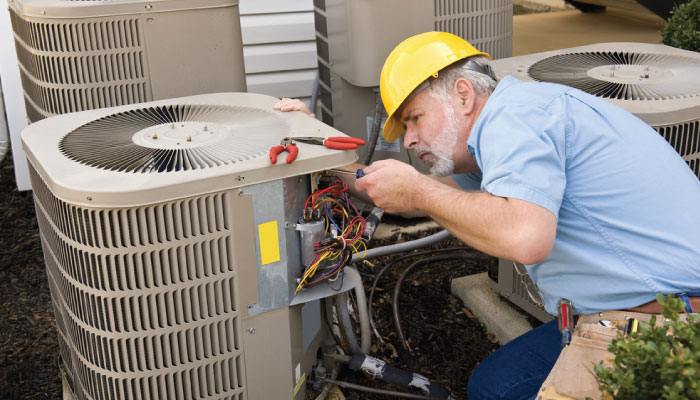Maintaining your air conditioner is essential for its optimal performance and longevity. One of the most crucial aspects of this maintenance is routinely changing or cleaning the air conditioner filters. This practice not only improves the efficiency of your AC unit but also ensures a healthier indoor environment. In this article, we’ll explore the importance of air conditioner filter maintenance, discuss different types of air conditioner units, and suggest upgrades for enhanced performance and energy efficiency. Finding air conditioning contractor company near you can be a task, its best to start with google!
Why Routine Air Conditioner Filter Maintenance Matters
1. Improved Air Quality
Air conditioner filters trap dust, pollen, pet dander, and other airborne particles. Over time, these filters become clogged, reducing their effectiveness. A dirty filter can circulate pollutants back into your home, affecting indoor air quality. Regular maintenance helps to ensure that your filters are doing their job, keeping the air in your home clean and healthy.
2. Enhanced Energy Efficiency
When filters are clogged, your air conditioner has to work harder to pull air through the system. This extra effort requires more energy, which increases your utility bills. By regularly replacing or cleaning filters, you can maintain your AC unit’s energy efficiency, saving money on your monthly bills.
3. Prolonged Equipment Life
A well-maintained air conditioner experiences less strain and wear over time. Dirty filters can cause the system to overheat, leading to potential damage and costly repairs. Routine maintenance helps to prolong the life of your AC unit, ensuring it runs smoothly for years to come.
4. Better Cooling Performance
Clogged filters can restrict airflow, making it difficult for your air conditioner to cool your home effectively. By maintaining clean filters, you ensure that your AC unit can deliver optimal cooling performance, keeping your home comfortable even during the hottest months.
Types of Air Conditioner Units
1. Central Air Conditioning Systems
Central air conditioning systems are popular in larger homes and commercial buildings. They use a network of ducts to distribute cooled air throughout the space. These systems typically include a central unit located outside the building and an indoor unit connected to the ductwork.
2. Ductless Mini-Split Systems
Ductless mini-split systems are a versatile and energy-efficient alternative to central air conditioning. These systems consist of an outdoor unit and one or more indoor units mounted on walls or ceilings. Each indoor unit can be controlled independently, allowing for zoned cooling.
3. Window Air Conditioners
Window air conditioners are compact units designed to fit into a window or a wall opening. They are ideal for cooling individual rooms or small spaces. These units are relatively inexpensive and easy to install, making them a popular choice for apartments and smaller homes.
4. Portable Air Conditioners
Portable air conditioners are standalone units that can be moved from room to room. They require a venting system to expel hot air, typically through a window. Portable AC units are convenient for temporary cooling needs or spaces where permanent installation is not feasible.
Upgrading Your Air Conditioner: What to Consider
1. Energy Efficiency
When upgrading your air conditioner, consider models with high Seasonal Energy Efficiency Ratio (SEER) ratings. Higher SEER ratings indicate better energy efficiency, which can significantly reduce your cooling costs over time. Look for ENERGY STAR certified units for the best performance.
2. Size and Capacity
Choosing the right size air conditioner for your space is crucial. An undersized unit will struggle to cool your home, while an oversized unit will cycle on and off frequently, wasting energy. Consult with a professional to determine the appropriate size and capacity for your needs.
3. Advanced Features
Modern air conditioners come with a range of advanced features designed to enhance comfort and convenience. Look for units with programmable thermostats, variable-speed compressors, and smart home compatibility. These features allow for better temperature control and energy management.
4. Indoor Air Quality Enhancements
Consider upgrading to an air conditioner with built-in air purification features. Some units include advanced filtration systems, UV light technology, or ionizers to improve indoor air quality. These enhancements can be especially beneficial for households with allergies or respiratory conditions.
Conclusion
Routine air conditioner filter maintenance is vital for maintaining indoor air quality, enhancing energy efficiency, prolonging equipment life, and ensuring optimal cooling performance. By understanding the importance of this maintenance and considering the types of air conditioner units available, you can make informed decisions about upgrades that will benefit your home and your budget. Whether you choose a central air system, ductless mini-split, window unit, or portable air conditioner, regular filter maintenance will help you enjoy a comfortable and healthy living environment.
For professional Ocala HVAC contractor and expert advice on air conditioner maintenance and upgrades, contact Vetcon HVAC & Plumbing Services, Inc. Our team of experienced technicians is dedicated to providing top-notch service and ensuring your home stays cool and comfortable all year round.

